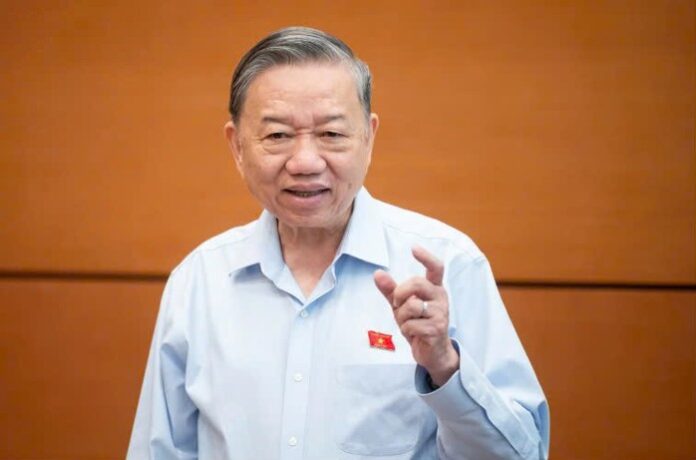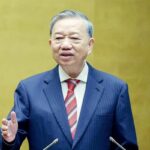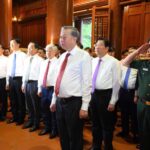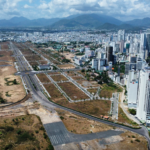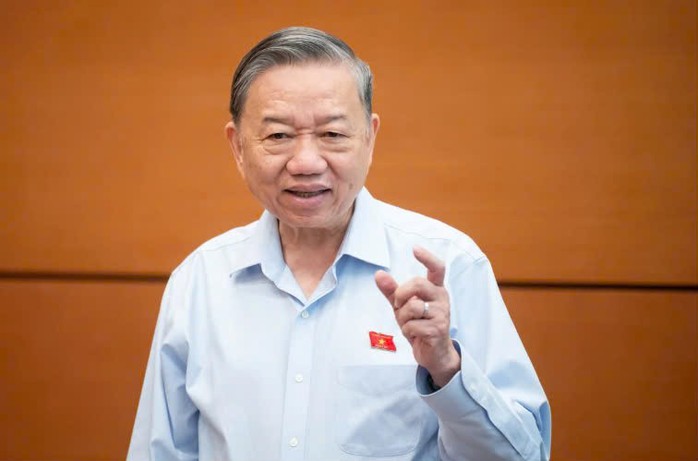
General Secretary To Lam during a discussion session of the National Assembly. Photo: Pham Thang
Vietnamese culture is steeped in frugality and simplicity. This is reflected in popular proverbs and folk sayings such as “Khéo ăn thì no, khéo co thì ấm” (“Waste not, want not”), “Ít chắt chiu hơn nhiều phung phí” (“A little thrift is better than a lot of extravagance”), and “Ai ơi chớ bỏ ruộng hoang/Bao nhiêu tấc đất tấc vàng bấy nhiêu” (“Don’t neglect your fields, every inch of land is worth its weight in gold”).
Ho Chi Minh, the revolutionary leader and founder of modern Vietnam, embodied these values. In the first meeting of the Provisional Government of the Democratic Republic of Vietnam on September 3, 1945, he outlined six urgent tasks, with a focus on promoting frugality and austerity to combat hunger and rebuild the nation. He elaborated on the concept of thrift, explaining that “Kiệm là thế nào? Là tiết kiệm, không xa xỉ, không hoang phí, không bừa bãi…; Tiết kiệm không phải là bủn xỉn. Khi không nên tiêu xài thì một đồng xu cũng không nên tiêu. Khi có việc đáng làm, việc ích lợi cho đồng bào, cho Tổ quốc, thì dù bao nhiêu công, tốn bao nhiêu của, cũng vui lòng. Như thế mới đúng là kiệm. Tiết kiệm phải kiên quyết chống xa xỉ… Vì vậy, xa xỉ có tội với Tổ quốc, với đồng bào” (“Frugality means not being wasteful or extravagant… Thrift does not mean being stingy. When it is not necessary to spend, not even a penny should be spent. But when it comes to doing something beneficial for the people and the nation, no matter how much effort or money is spent, it should be done gladly. This is true frugality. We must resolutely oppose extravagance… Therefore, extravagance is a crime against the nation and the people.”)
Ho Chi Minh believed that thrift was an important aspect of social life. He emphasized the need to conserve labor power, time, and the lives of soldiers and citizens. He urged the government to be frugal with money and the people’s resources, stating, “Phải biết quý trọng sức người là vốn quý nhất của ta. Chúng ta cần hết lòng chăm sóc sức khỏe và sử dụng thật hợp lý sức lao động của nhân dân ta” (“We must value human resources as our most precious asset. We should take good care of the health and make the best use of the labor force of our people.”). He also stressed the importance of saving every drop of the people’s blood to build the future of the nation.
Throughout the revolutionary periods, the Party and the State have always prioritized frugality and considered it a key policy. During the wars, under the leadership of Ho Chi Minh and the Communist Party, and with the exemplary frugality of Party members and officials, the people tightened their belts, sacrificing personal comforts to support the front lines. In the renewal era, the Party has issued many directives on this issue, such as Directive No. 21-CT/TW dated December 21, 2012, on promoting frugality and anti-wastefulness, and Directive No. 27-CT/TW dated December 25, 2023, on strengthening the Party’s leadership in practicing thrift and anti-wastefulness.
The Party’s guidelines and the State’s policies and laws have been effectively implemented, resulting in positive outcomes. Organizations and individuals, especially cadres and party members, have focused on reducing regular expenses and enhancing the role of leaders in practicing thrift. Some agencies and units have issued notices requesting “thực hành tiết kiệm, không nhận hoa chúc mừng” (“practicing thrift and not accepting congratulatory flowers”) during their anniversaries or commemorative events. Many conferences and meetings have been simplified, shortened, and held online to save time and costs. The practice of sharing vehicles for high-ranking officials during work trips has also been implemented in many places.
Land abandonment and prolonged land use planning have been gradually addressed. The management and use of office spaces have generally complied with purposes and standards. Many businesses have improved the management of production-related norms, especially indirect costs, to reduce product prices. Since the end of 2024, in line with the conclusions of the Central Committee, the Politburo and the Secretariat have led and directed the basic completion of the rearrangement and streamlining of the apparatus of Party, Government, National Assembly, and Fatherland Front organizations at the central and local levels. This has resulted in cost savings and the immediate implementation of the policy of exempting tuition fees for students.
In addition, according to preliminary calculations, the unification of provinces, the elimination of the district level, and the merger of communes, as agreed upon by the 11th plenum of the 13th Party Central Committee, is expected to save more than VND 20,000 billion per year in regular expenditures during the 2025-2030 period and over VND 30,000 billion per year from 2030 onwards. This calculation does not include the value of the more than 18,500 premises of agencies and units that will no longer serve as “public offices” with the implementation of the local government model at two levels.
Despite these achievements, there are still many shortcomings and limitations in practicing thrift, with very low efficiency. The policies on thrift have not been truly effective, and waste and loss of assets and state budget have occurred on a large scale with serious consequences. Practicing thrift has not become a regular habit, and it has not yet become a constant awareness among a part of cadres, party members, civil servants, public employees, and the people. Wastefulness exists not only in state agencies but also in the social activities of the people. The tendency to favor foreign, luxury, and branded goods, as well as expensive gifts, and the hedonistic psychology of a part of the people, especially the youth, while the country’s average income has just crossed the middle-income threshold and labor productivity remains low, are worrisome manifestations of the lack of thrift.
Along with the majority of cadres and party members who always uphold the Party’s nature and exemplary frugality and have a high sense of responsibility in managing, using, and saving public property, not falling into the “vortex” of power, money, extravagance, and hedonism, there is still a not small number of cadres and party members, including leaders, who lack a sense of responsibility, indulge in hedonism and materialism, and cause waste and loss of funds and assets, extravagance in consumption, and misuse of public funds for personal or group interests.
The main reasons for the above-mentioned shortcomings and limitations are the low sense of responsibility and determination of some agencies, organizations, and individuals, as well as the lack of consistency and decisiveness. The implementation of thrift and anti-wastefulness has sometimes been formalistic and perfunctory. Some ministries, sectors, and localities have not been proactive in building solutions to deploy thrift and anti-wastefulness in their assigned fields and scopes of management. The Law on Thrift Practice and Anti-Wastefulness has not really gone into practical life, and the provisions are still general, leading to the lack of effective mechanisms and measures in implementation. The program on thrift practice and anti-wastefulness is still formalistic and has not gone into the practical life of each agency, unit, locality, family, and individual, and has not yet set out specific goals, targets, and evaluation criteria. Many waste and violations have been detected but have not been handled promptly. There has been a lack of timely commendation and reward for those who practice thrift or detect waste, resulting in a lack of strict compliance with the law.
The 11th plenum of the 13th Party Central Committee agreed on historic decisions, including the continued rearrangement of the political system organization, the unification of some provinces, the elimination of the district level, and the merger of communes, creating a fundamental turning point in practicing thrift in our country in the new period. To meet the highest requirements in the new revolutionary era agreed upon by the 11th plenum, which are “high-quality, fast, and sustainable development,” “proactive, self-reliant, and autonomous development,” and the highest goal of “stabilizing and improving the people’s lives,” along with the arrangement of a streamlined and strong political system organization, it is necessary to focus on implementing well the following issues:
First, unify the perception that practicing thrift and anti-wastefulness is one of the most fundamental solutions for the country to overcome all storms in the context of many fluctuations in the international situation, directly affecting socio-economic development and ensuring social security. Historical facts have proved that thrift is one of the key factors that create great potential for the entire Party, people, and army to overcome economic difficulties, even in the face of “hunger,” to save rice for the battlefield, and to defeat the invading colonialists and imperialists, liberating the nation and reunifying the country. In the face of new difficulties and challenges, with the tradition of perseverance and indomitability and the united strength of the entire political system and the people, promoting the practice of thrift and anti-wastefulness will create great internal strength and internal resources to promote the sustainable development of the economy, helping the country to stand firm and achieve strategic goals, while taking better care of the people’s lives.
Therefore, all citizens, agencies, units, organizations, and businesses need to have specific plans and implement reasonable income and expenditure; cadres and party members, especially leaders and managers, must set an example and encourage their families and the people to actively participate. All industries, professions, families, and individuals need to promote production and business, improve labor productivity, quality, and efficiency, and thoroughly practice thrift, minimizing waste of time, money, property, and energy.
Second, strongly implement fundamental solutions to create a substantive change in practicing thrift and anti-wastefulness. The focus is on: (i) Focusing on perfecting the institution to thoroughly overcome the waste caused by the institution, removing obstacles and difficulties hindering development, unblocking bottlenecks for development, especially issues related to bidding, budget, public investment, private sector, science and technology, innovation and digital transformation, and the revolution in rearranging and streamlining the organization of the political system. Research and amend the Law on Thrift Practice and Anti-Wastefulness soon to create a comprehensive political and legal basis for practicing thrift in all sectors, all professions, all cadres, party members, and people. (ii) Maximize administrative procedure reduction, compliance costs, and create the most favorable conditions for people and businesses; shift from pre-inspection to post-inspection, eliminate the “application-grant” mechanism, decentralize and empower competent agencies and localities to resolve and take responsibility. In 2025, ensure that 100% of administrative procedures related to enterprises are performed online, smoothly, and effectively; 100% of administrative procedures are not limited by provincial administrative boundaries. (iii) After rearranging the organization of the political system to be streamlined and strong, if we want it to operate with high efficiency, effectiveness, and efficacy, a very fundamental factor is to focus on building a contingent of officials with knowledge, skills, and correct working attitudes to achieve the highest efficiency in each field they are in charge of. In particular, management skills, enthusiasm, and responsibility in each job and task assigned; standard culture in communication, behavior, and proactive attitude in practicing thrift are requirements for officials in the new organization. (iv) Strengthen discipline and rules in the management and use of finance and budget; practice thrift and anti-wastefulness, and effectively use state financial resources in association with mobilizing social resources and rearranging and streamlining the apparatus. Strengthen the management and use of public property, ensuring compliance with standards, norms, and regulations and suitability to the requirements of tasks, focusing on arranging and handling assets, especially houses and land, associated with the rearrangement and streamlining of the apparatus. Resolutely and drastically save expenditures that are not really necessary to ensure resources for natural disaster prevention and control, epidemic prevention, and investment for development and economic development; strive to increase the rate of breakthrough investment in science and technology development, innovation and national digital transformation, and support for private economic development. (v) Create a legal corridor and resources for the development of the private sector, promote the spirit of entrepreneurship and innovation in the whole society, and create conditions for all people to have the opportunity to contribute, increase labor productivity, and enrich themselves, their families, and society.
Third, build a culture of thrift; make practicing thrift and anti-wastefulness become “voluntary,” “spontaneous,” and “daily food and drink”. Research and launch and maintain annually the “Day of National Thrift Practice” to promote and spread the movement of the whole society to raise awareness of practicing thrift. Promote the movement “Studying and following Ho Chi Minh’s thought, morality, and style,” and commend and honor in a timely manner the exemplary models of officials, soldiers, and people with initiatives in their work and economic development that bring practical effects in practicing thrift; strictly handle collectives and individuals, first of all, the heads of agencies and units in the political system and party members who do not fully implement the Law on Thrift Practice and Anti-Wastefulness. Continue to promote the fight against corruption, waste, and negativity, considering this as one of the fundamental solutions to build a culture of thrift.
In his Report to the Fourth Congress of the Communist International, V.I. Lenin emphasized, “However, we must streamline this state apparatus, we must save as much as possible, as much as possible. We save on everything, even on school expenses. We have to do this because we know that if we do not save heavy industry, if we do not restore heavy industry, then we will not be able to build any industry at all, and if we do not have industry, then, in general, we will perish, we will no longer be an independent country.” Ho Chi Minh, our beloved leader, also stated, “In the cause of building socialism, thrift is a great policy, a great morality, a style of work and life that can never be neglected.” To lead the country into a new era and succeed, the entire Party, people, and army must strive to practice thrift and anti-wastefulness.
—–
[1] See also: Vu Ngoc Phan, Tục ngữ ca dao, dân ca Việt Nam (Proverbs, Folk Songs, and Folk Songs of Vietnam), Literature Publishing House, 1996; Phuc Hai, Tuyển chọn tục ngữ ca dao dân ca Việt Nam (Selected Proverbs, Folk Songs and Folk Songs of Vietnam), Times Publishing House, 2014; Mai Khanh, Thành ngữ – tục ngữ, ca dao – dân ca Việt Nam (Idioms – Proverbs, Folk Songs and Folk Songs of Vietnam), Literature Publishing House, 2022…
[2] Hồ Chí Minh, Toàn tập (Ho Chi Minh, Complete Works), Vol. 6, p.122-124
[3] Hồ Chí Minh, Toàn tập, tập 4 (Ho Chi Minh, Complete Works, Vol. 4), p.181
[4] Hồ Chí Minh, Toàn tập, tập 5 (Ho Chi Minh, Complete Works, Vol. 5), p.122
[5] Hồ Chí Minh, Toàn tập, tập 13 (Ho Chi Minh, Complete Works, Vol. 13), p.70
[6] Hồ Chí Minh, Toàn tập, tập 7 (Ho Chi Minh, Complete Works, Vol. 7), p.335
[7] Hồ Chí Minh, Toàn tập, tập 4 (Ho Chi Minh, Complete Works, Vol. 4), p.229
[8] Hồ Chí Minh, Toàn tập, tập 5 (Ho Chi Minh, Complete Works, Vol. 5), p.217
[9] Hồ Chí Minh, Toàn tập, tập 3 (Ho Chi Minh, Complete Works, Vol. 3), p.457
[10] V.I. Lenin, Toàn tập (V.I. Lenin, Complete Works), National Political Publishing House – Truth, Hanoi, 2005, Vol. 45, p.333-334
[11] Nhan Dan Newspaper, No. 2149, dated February 5, 1950, p.2
“General Secretary To Lam visits Kim Lien Relic Site and presents gifts in Nam Dan District.”
On the occasion of the 135th anniversary of President Ho Chi Minh’s birth (May 19, 1890 – May 19, 2025), on May 15, 2025, General Secretary To Lam, along with a delegation of central and provincial leaders from Nghe An, paid a visit to the Kim Lien National Special Relic Site in Nam Dan District, Nghe An Province.
The Only Ward in Hue That Didn’t Undergo Merger: What Makes It So Special?
The picturesque neighborhood of Duong No in the heart of Thuan Hoa district stands out as a unique entity among the 133 administrative wards that comprise the vibrant city of Hue. With a rich tapestry of cultural, historical, and natural elements, this charming locale has resisted the tide of mergers and reorganizations that have swept through other communities since the beginning of 2025.
“Accelerating Justice: Unraveling Complex Cases with Swift Efficiency”
In 2025, the Ministry of Public Security will accelerate its efforts and strive to conclude investigations into major cases as planned by the Steering Committee. This proactive approach underscores the Ministry’s commitment to swift and efficient resolution, ensuring that justice is served without delay.

